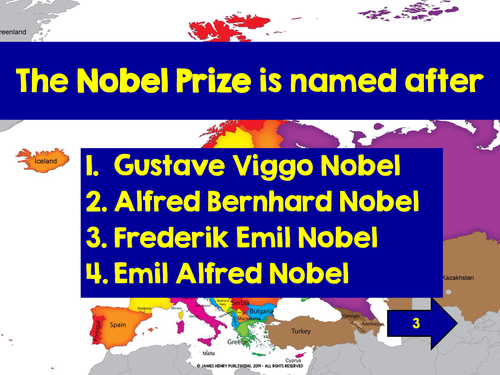




EUROPEAN DAY OF LANGUAGES QUIZ SAMPLER This is a sampler of six questions and answers from the full European Day of Languages Quiz 1: The full set outline is as follows:
IDEAL TEAM OR CLASS QUIZ FOR THE EUROPEAN DAY OF LANGUAGES -
AND AS A YEAR-ROUND GENERAL KNOWLEDGE QUIZ!
The quiz features 100 multiple-choice questions, each with four possible responses. It’s perfect for developing students’ awareness, understanding and knowledge of all things European. The questions range from basic general knowledge to more specialised factual knowledge.
The themes and topics are:
= arts & culture
= famous people
= food
= geography
= history
= landmarks & monuments
= language
= literature
= music;
= politics
= science
= society.
You can be Quiz Question Captain, but students do enjoy taking on that role in turns. The questions often stimulate further and deeper discussion about particular themes and topics - for example, the question regarding Eyjafjallajökull is a great example of a ‘modern-day’ volcano eruption, and the implications for both national and international communities - there are lots of good quality clips available online which students find interesting to watch
and then discuss. I often prompt students for additional responses based on the answer options - for example The longest river in Europe, the Volga, runs through which countries? Which countries does the Danube or the Rhine run through? and so on. I always award extra points for this, which increases the competitive edge a little!
The quiz is non-editable for copyright reasons. The first slide shows a map of Europe, which I use to discuss general geography and the range of European countries, some of which students may not be aware of. Each question slide is followed by a corresponding answer slide, with the correct response in capital letters.
The quiz is ideal for whole-group or team quizzes, with students choosing a European-themed team name. Play in homeroom / form time or in any subject area lesson as a brain-break - the questions really are cross-curricular! I use the quiz several times at intervals across the school year - this really does put students’ memory and developing knowledge to the test. The quiz goes down
particularly well on the European Day of Languages, and at key points in the school year: end of year, back to school, Christmas and so on.
The full quiz is available here (£3):
https://www.tes.com/teaching-resource/european-day-of-languages-quiz-3-12578909
The quiz is non-editable in a zipped format. It may not be copied, rewritten, shared or distributed in any way. The license for purchase is a single-user license only. This sampler is free to download, but Terms of Use still apply. Please read the Terms of Use carefully.
THANKS AND HAVE A GREAT EUROPEAN DAY OF LANGUAGES!
Something went wrong, please try again later.
Nice quiz!
Report this resourceto let us know if it violates our terms and conditions.
Our customer service team will review your report and will be in touch.